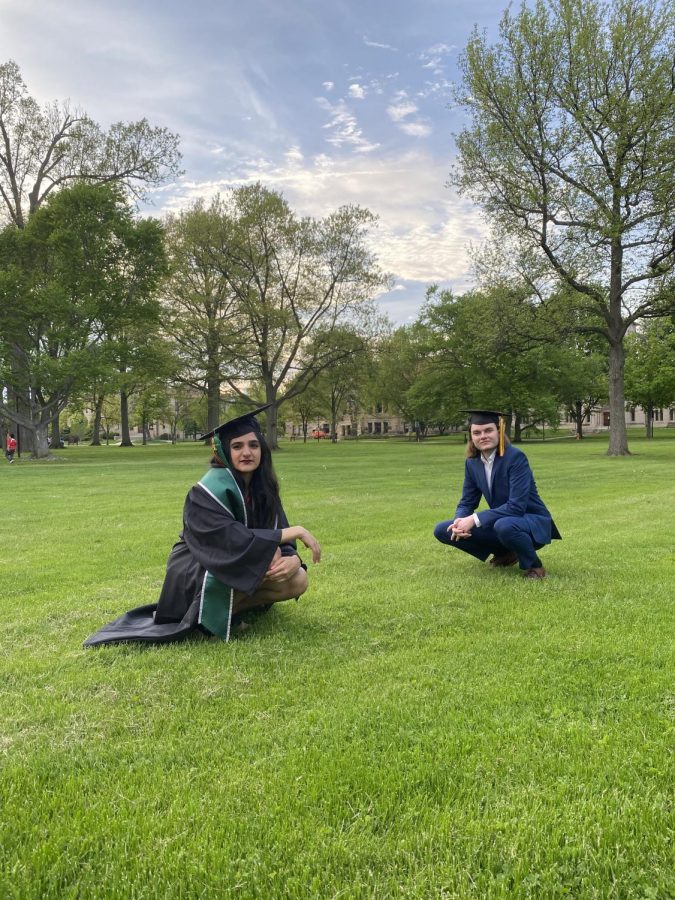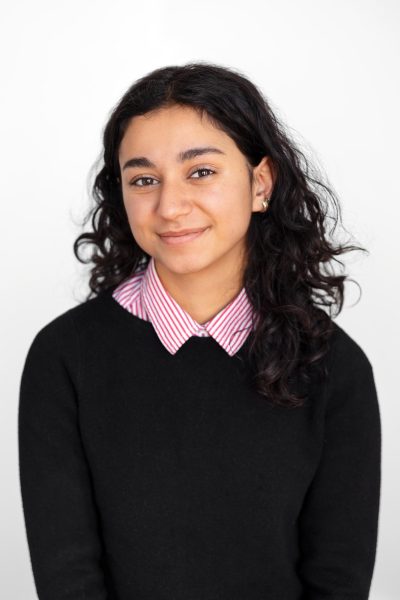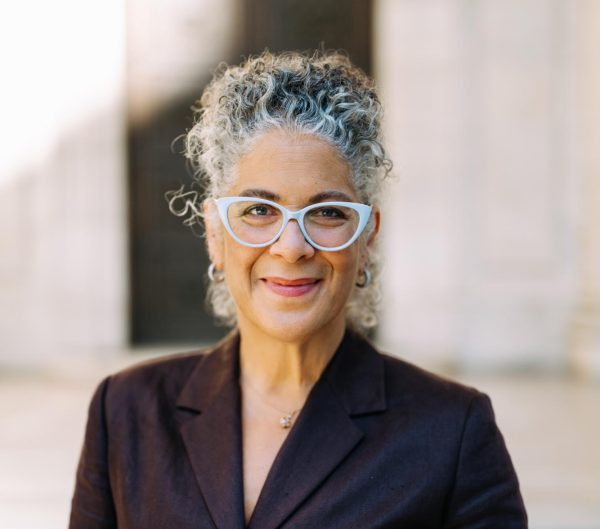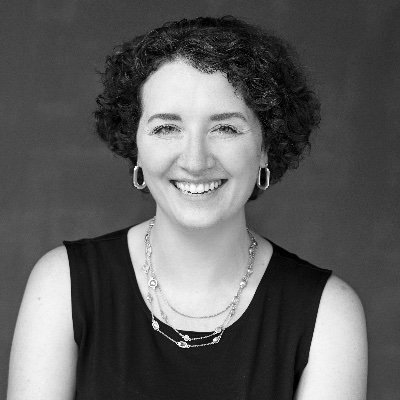OTC: Review Editor-in-Chief Nathan Carpenter and Managing Editor Ananya Gupta
College fourth-years Editor-in-Chief Nathan Carpenter and Managing Editor Ananya Gupta.
College fourth-years Ananya Gupta and Nathan Carpenter have served as the respective managing editor and editor-in-chief of The Oberlin Review for the past two years. As the first members of the Review staff to remain in these senior roles for two consecutive terms, they have taken special initiative in shaping the direction and community of the paper. From instituting a paperless production process and an annual staff retreat, to hosting a journalism symposium and creating a special environmental issue, they have had major accomplishments at The Oberlin Review. Next year’s incoming editors-in-chief and managing editor interviewed Gupta and Carpenter about their favorite memories, the turmoil of this year, and what has characterized their time helming The Oberlin Review.
This interview has been edited for length and clarity.
Can you tell us about how the Review has been a part of your college experience?
Nathan Carpenter: It has very much been a part of my college life. What I would say is the Review was never something I came to college intending to do. I hadn’t worked as a journalist in high school; it wasn’t an interest of mine coming into Oberlin. So when I started working there, it was kind of through a weird confluence of events — I’d written a couple op-eds the fall of my first year because I was a fellow on the Clinton campaign. And the Opinions editor at that time, Sami Mericle, OC ’17, was on the softball team and needed someone to sub in for her a few hours a week that spring while she was at practice. So I became a contributing editor just because she asked me to and I didn’t have anything else to do. It quickly became the community there that I really loved, and that’s what kept me really invested.
And then over time, I just became very invested in writing about Oberlin and learning more about Oberlin and doing my part to tell the story of what was going on on campus and in the surrounding areas. That was a responsibility that I took very seriously, and I always tried to hold myself to a high standard. I think the skills I’ve learned in that role in terms of, the writing and editing and reporting skills, but also the ability to hold myself accountable, the ability to hold multiple stories at once and try to bring them together into an article — I think it’s profoundly shaped the way that I think about things, and it certainly was one of the most defining parts of my college experience.
Ananya Gupta: I’d have to agree – while the way I got into the Review was completely different than Nathan. I am an international student, and at first all of my friends were other international students, and I realized that I hadn’t interacted with any Americans at all despite having lived in America for almost a whole year. Part of the reason students go abroad is to kind of get to know that culture and interact with people from that culture and kind of assimilate in that way. So I saw an opportunity to work at the Review.
I did have some prior experience: I used to be the editor-in-chief of my high school magazine. But I didn’t know anything about The Oberlin Review when I went into the interview, and I was very lucky to be picked as an Arts & Culture editor. And immediately, I was welcomed into this really nice community of people who all cared about something other than themselves [and] made so many friends here. I think this was my way of engaging with the Oberlin community in a way that made a real difference [that] was tangible from week to week. I’m going to be a content editor now, so everything I’ve done at The Oberlin Review is going to translate into what I do in real life. I’m very excited about that.
I was thinking about how you both have put so much time and energy into this paper, and I was wondering what motivated that effort, and has it felt like a sacrifice at all?
NC: Well, I think it definitely is in terms of time put in and stress, and you sacrifice the amount of energy you’re able to put into school and into other things. What I came to realize more and more over three and a half years on staff and two years as editor-in-chief is it’s just an incredible privilege to be able to edit a publication that really seeks to tell the story of a community. And sometimes we do fall short — that’s part of it, and those are hard days — but that’s an incredible privilege, one that I felt lucky to have and one that I took very seriously in terms of holding myself to a high standard and making sure that we weren’t leaving stones unturned [and that we were] telling as full of a story as we could. So that’s where the extra time came in for me: wanting to make sure that we were doing as complete a job as we could out of a sense of accountability to those around me.
AG: The people here did a lot for me in my sophomore year in building me into someone who is a more confident and outgoing person, and I just wanted to pay it forward with the people who were coming in. I really felt the responsibility of The Oberlin Review when the Oberlin News-Tribune closed its local office. At that moment, I realized that we would be the paper of record for Oberlin. And that’s when it really hit me that if we don’t do this, no one else will. I think that’s something that really made what I was doing feel really important.
I also want to add that I think Nathan and I were very lucky to be able to do this for a second year, because we were able to bring so many of the other things that we care about in our lives, especially environmental initiatives, into the job. Other big ideas and projects that we’d conceived of but didn’t think could be a reality in our first year [with the Review] we were able to bring into the second year.
Can you talk more about what those goals were and how you came up with some of the big changes and big projects that you ended up being able to achieve?
NC: I think it was really key to have the second year because not only is it easier to preserve institutional knowledge and memory that way, but you [also] have your bearings a little more. So we were able to, once we had established more of a routine, think about, “Okay, what are the ways that we want to get creative about what we’re doing? What are the ways that we want to think about both the unique opportunities and challenges of journalism at this time, and more specifically college journalism?”
So we put together the magazine that Ananya was talking about, about climate and environment. We did the symposium as well, which is something that Review staff had done before, but we were lucky to be able to work with The Grape on that and to have a lot of lead up time to envision what we would want out of that. That’s another enormous privilege of this job: being able to put projects like that into motion and just be surrounded by teams of people who are just so capable and ready to work.
AG: When we came up with the journalism symposium, the support from the Office of the Student Treasurer, from the Student Finance Committee, from the College, from our staff, from The Grape — it was just overwhelming how many people wanted to see it succeed. And the alumni [speakers], of course, who were so happy to come and help us and participate in this. … Oberlin is such a supportive community, and you just need to show a little bit of initiative to get amazing returns on it.
Content-wise, is there a specific story that either you worked on or watched someone else work on that particularly sticks out to you?
NC: Well, I think by far the most challenging story, which is not just one article, was writing about Gibson’s Bakery. … I always felt a strong accountability to make sure that we were really, really dotting our I’s and crossing our T’s with [that] coverage and making sure that it was fair and balanced and accurate. [And then] after the verdict came out last June, it became all of a sudden this national news story. Most people reading were entering at that moment, so it was challenging to think about “How do you provide context for something where the roots are so much deeper than that particular moment?” And they’re deeper than even the initial altercation that set this particular saga off in 2016. So that was hard. Of our coverage also, that was probably the most heavily scrutinized, by both people in Oberlin and people nationally. … I’m proud of how we handled the coverage, and I think that we did a good job. That also was a testament to the folks who were writing — [College second-year and incoming Editor-in-Chief] Anisa [Curry-Vietze] wrote some of those pieces, and other people wrote those articles too, and did really good reporting.
AG: I just think that the Class of 2020 has had a wild ride. Starting from the Trump election and ending with COVID-19, we’ve covered a wide range of really, really difficult topics. I’m so lucky to have worked with two great sets of EICs — Nathan, [College third-year] Katherine [MacPhail], Sydney [Allen, OC ’19] — that were so diligent in their coverage. And sometimes they messed up, but they put every ounce of effort that they could into making it nice. Stop smiling at me like that!
NC: No, I just agree. Sometimes, you know, sometimes you mess up.
AG: Yeah. Only human.
How did COVID-19 change things for the paper? What was that impact on you?
NC: I think the moments where I felt most in control of what was going on were when I was reporting and writing about [what was happening]. And I think we’ve also been able to do cool things while we’ve been remote. I was really proud we were able to get a 72-page magazine out, which happened almost entirely remotely. In the long term, I hope that this time is used as a launch board to envision the ways that the Review can strengthen the things it does digitally. I think that there’s a lot of value in print. … But this is revealing in a lot of the ways that digital engagement can also be really important and cool.
AG: I wasn’t reporting on COVID-19, and so I was more dealing with the heartbreak of not getting to complete my term as managing editor as I thought it would be. But I still had the opportunity to come up with some way to get the Review to continue functioning remotely. I’m very proud that we were able to rally both with the special issue as well as with regular publishing. I think we’ve come up with several other cool ideas like the COVID-19 hub and the other things that are coming up over the summer that we’re going to publish. So I think we have really made the best of the situation.
Do you have any great shames to expose?
AG: I have one for Nathan. A small shame. I think we had had an Editorial Board meeting, and [College fourth-year and Opinions editor] Jackie [Brant] left. Syd and I were in the office, and Nathan saw a really small spider. He jumped six feet in the air and shrieked at the top of his lungs and scared the living daylights out of me — because I’m jumpy. And that’s my shame.
Any best quotes?
AG: He actually has my favorite quote that’s on that wall. “The Oberlin Review: Avoiding It Until We Figure It Out.” … I [had a quote] very recently that’s on the wall that says, “I have made a grave error — a grerror.”
NC: That was a good one.
Can you speak a little about what’s next for both of you next year?
AG: I am working for an environmental startup in Atlanta. I’m going to be a content editor — it’s an environmental knowledge and solutions platform, and they work with connecting big corporations with innovators, specifically in the plastic pollution and circular economy industry.
NC: And I will be working at Oberlin College and Conservatory as the director of the Peer Advising Leadership and Sophomore Opportunity & Academic Resources programs.
Do either of you have anything else you want to add about your time at the Review?
AG: We just loved it.
NC: Yeah. … I will miss the basement.










